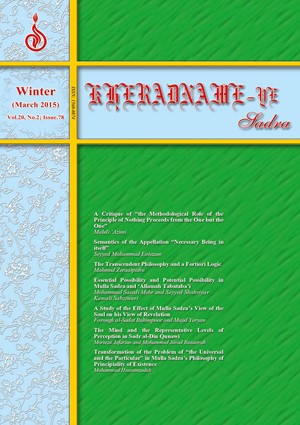Subject Areas : مطالعات حوزه عرفان و کلام اسلامی
Morteza Jafarian 1 * , Mohammad Javad Rezaeirah 2
1 - Tehran University
2 -
Keywords: Perception truth phenomen levels of knowledge object levels of existence mind knowledge essence subject ,
Abstract :
The problem of the validity and limits of Man’s knowledge and perception and the relationship between the truth and essence of objects and their mental manifestations requires the clarification of the role of the mind in perception, their relationship with each other, and their relationship with the object. Although Sadr al-Din Qunawi has already explored the issues of knowledge and perception following an ontological approach, he has also paid particular attention to the role of the subject in the process of attaining knowledge while posing the problems of “knowledge” and its relationship with “existence” and its levels. His discussions in this regard include some innovative theories which cast some light on some of the ambiguous problems of the mind and knowledge and clarify the process of the emergence of epistemological philosophical thoughts in Islamic philosophy. In his view, Man’s acquired knowledge, which generally includes sense, imaginal, and intellectual perceptions, has two basic characteristics: On the one hand, knowledge is the manifestation of the object by itself and reveals some of the aspects, levels, and modes of its truth; on the other hand, it is continually consolidated within the mental frameworks and limits of the subject and is influenced by the active or passive role of the mind. In other words, knowledge is the product of the interaction between the subject and object. This theory, which was presented long before Kant’s well-known theory, has a different point of departure from that of Kant. However, in terms of its moving away from naive realism, which was the common theory of that time, it enjoys great importance. Qunawi also posed the problem of the cognation and coextensiveness of knowledge and perception with existence before Mulla Sadra and explained and analyzed many of its consequences and concomitants.
ابنسينا، الشفاء ـ الالهيات، قم، كتابخانة آيت الله مرعشي، 1404ق.#
استيس، و. ت، فلسفة هگل، ترجمة حميد عنايت، تهران، اميركبير،1380.#
جوادي آملي،عبدالله، شرح حكمة المتعاليه، بخش سوّم از جلد ششم، تهران، الزهرا، 1372.#
رازي، فخرالدين، شرح الاشارات و التنبيهات، مقدمه و تصحيح نجفزاده، انجمن آثار و مفاخر فرهنگي، تهران، 1384ش.#
سبزواري، ملاهادي، شرح المنظومه، ج2، تهران، نشر ناب، 1369.#
طباطبايي، سيدمحمدحسين، اصول فلسفه و روش رئاليسم، قم، بوستان كتاب،1387.#
طوسي، نصيرالدين، تلخيص المحصل، بيروت، دار الاضواء، 1405ق.#
طوسي، نصيرالدين، اجوبةالمسائل النصيريه، به اهتمام عبدالله نوراني،تهران، پژوهشگاه علوم انساني و مطالعات فرهنگي، 1383.#
قونوي، صدرالدين، اعجاز البيان في تفسير ام القرآن، تصحيح سيدجلالالدين آشتياني، قم، بوستان كتاب،1381.#
قونوي، صدرالدين، النصوص،تحقيق حامد ناجي اصفهاني، تهران، آيت اشراق،1390.#
قونوي، صدرالدين، النفحات الالهيه، تصحيح محمد خواجوي، تهران، مولي، 1375.#
قونوي، صدرالدين، المراسلات، تحقيق و تصحيح كودرون شوبرت، بيروت، النشرات الاسلاميه،1995م.#
كانت، ايمانوئل، تمهيدات، تهران، مركز نشر دانشگاهي، 1370.#
مطهري، مرتضي، مجموعه آثار، ج9 و 10، تهران، صدرا، 1378.#
ملاصدرا، الحكمة المتعاليه في الاسفار الاربعه، ج1: تصحيح و تحقيق غلامرضا اعواني، تهران، بنياد حكمت ملاصدرا،1383.#
ملاصدرا، المبدا و المعاد، تصحيح، تحقيق و مقدمه محمد ذبيحي و جعفر شاه نظري، تهران، بنياد حكمت ملاصدرا،1381.#
ملاصدرا، المشاعر، تصحيح و تحقيق مقصود محمدي، در مجموعه رسائل فلسفي، ج4، تهران، بنياد حكمت ملاصدرا، 1381.#
ملاصدرا، مفاتيح الغيب، تصحيح، تحقيق و مقدمه نجفقلي حبيبي، تهران، بنياد حكمت ملاصدرا،1386.#
هگل، فنومنولوژي روح (پديدارشناسي ذهن)، تهران، شفيعي، 1382.#

